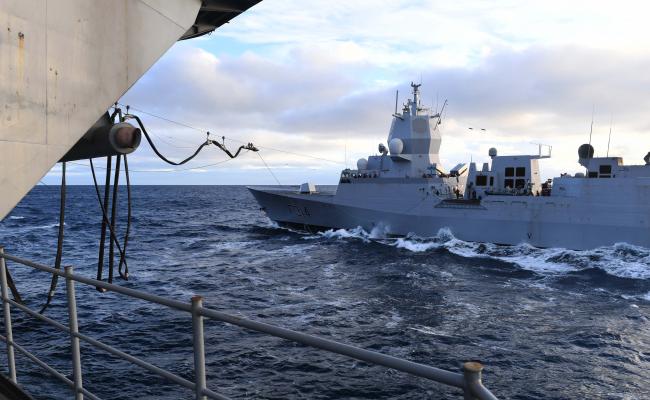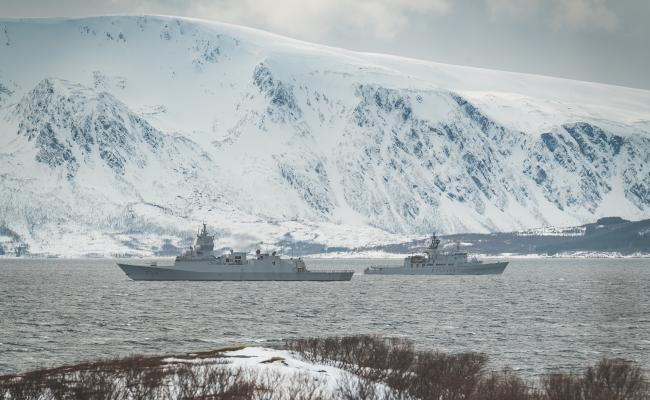Ukraine Tension between NATO and Russia may Affect the Arctic, Researchers Say
Russian vessels in Severomorsk. (Photo: Henning Lillegård, Norwegian Armed Forces)
“It is also fully possible to envision that a large Russian military offensive in Ukraine will lead to increased activity in the North, from both sides”, says Researchers Karen-Anna Eggen at the Norwegian Defense University College.
Eggen is echoed by Senior Researcher Julie Wilhelmsen at the Norwegian Institute of Foreign Affairs (NUPI), who also argues that the new crisis related to Ukraine may have spillover effects in the High North too.
What those effects will be, depends on whether or not the crisis escalates.
Russia has stationed some 100,000 soldiers and heavy military equipment near the Ukrainian border, and Russian president Vladimir Putin has presented new demands requiring NATO to withdraw its forces from all countries bordering on Russia, as well as stopping all military support for Ukraine.
The meetings taking place between the West and Russia this week are thus crucial. On Monday, Russian and American representatives met for conversations. On Wednesday, Russian officials will meet NATO members in the NATO-Russia Council.
“If the outcome is that one cannot agree on a de-escalation, and tension between Russia and NATO increases, this will spill over into the High North”, Senior Researcher Julie Wilhelmsen at the Norwegian Institute of Foreign Affairs (NUPI) says to High North News.
“Then, we will see even more of what we have seen until now following the war in Ukraine in 2014. Against all assumptions, tension then spread from Ukraine to the High North and is the reason why there is a new pattern of exercises and strong military positioning in the High North”, she adds.
Karen-Anna Eggen, Researcher at the Institute for Defense Studies at the Norwegian Defense University College, also stresses that experience show that the Russian actions towards Ukraine in 2014 have had negative effects for the European security situation in general, and also for tension levels in the Arctic.
Security policy breach
“Even though most dialogue platforms, such as the Barents Council and the Arctic Council, have been continued, there is a clear security policy breach in the region in the form of increased military activity and harsher political rhetoric from the Russian as well as the allied side”, Eggen says.
“It is also fully possible to envision that a large Russian military offensive in Ukraine will lead to increased activity in the North, from both sides. This will, in turn, change the threat perception on both sides. For Norway, if this were to be the case, it will be most demanding to maintain the relatively speaking good bilateral relationship in light of the security policy picture unfolding outside our borders. An additional point; the Arctic has an important geostrategic position and close attention is paid to what Russia does in Ukraine and the Black Sea region, as this may give indications on the action patterns of the Russian Armed Forces in the Arctic”, she adds.
Uncompromising attitude
“Russia has an uncompromising attitude. If it believes that what is offered from NATO does not heed its interest and its demands are not met in any way, I have no doubt that we will continue to see a rather aggressive military positioning from the Russian side, also in the High North, including for instance jamming of air traffic”, says NUPI researcher Wilhelmsen.
She explains that the positioning of an invasion force on the Ukrainian border is not just about a potential NATO membership, but also about the fact that NATO’s military infrastructure and bases have moved closer to the Russian border. The demands presented by Russia a few weeks ago are thus not only about Ukraine but about the military infrastructure of Russia.
De-escalating measures
“On the other side, if one actually manages to agree on some de-escalating measures such as for instance deciding to trust each other enough to withdraw a little from the border on both sides and creating a low-tension zone, we will also be able to notice this in the High North.”
May that pave the way for improved dialogue in the security policy area?
“It is not necessarily about dialogue, but about recognizing each other’s security interests and being willing to soften one’s own military positioning. If one agrees around the negotiating table that there is a need to limit tension and does something to achieve this, that may for instance affect how wour allies operate in the High North. This applies first and foremost to the USA, which sets the pattern in the region”, Wilhelmsen replies.
“That said, I am not very optimistic. The line from NATO Secretary General Jens Stoltenberg signalizes that NATO has nothing to give concerning the Russian demands. However, Stoltenberg has actually stated that it is in fact possible to negotiate with Russia and points out that he has done so during his time as prime minister in Norway. The overall position of NATO is nevertheless that Russia does not hold any co-decision rights when it comes to independent states’ affiliation with alliances or the direction of their own defense. Russia is the aggressor and giving in would be reasonable. The NATO countries do not really acknowledge that any Russian legitimate security interests are threatened through NATO’s activity”, she says in closing.
Also read
This article was originally published in Norwegian and has been translated by HNN's Elisabeth Bergquist.






